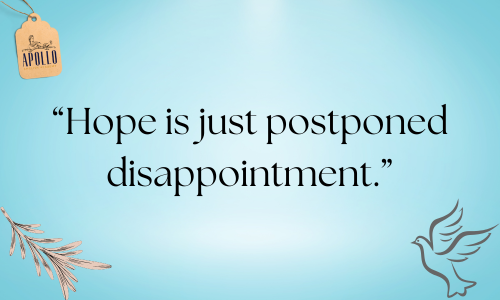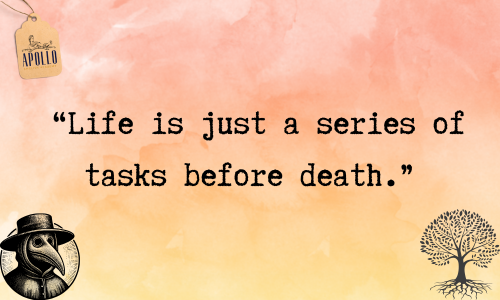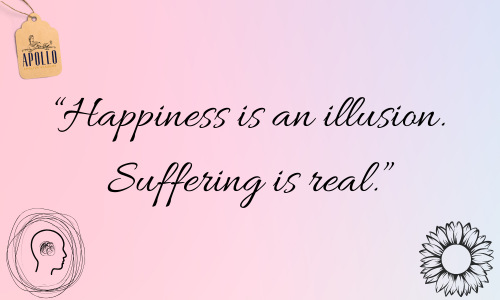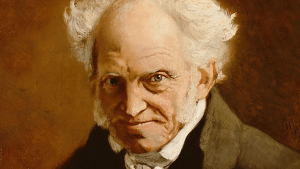Introdução:
Arthur Schopenhauer foi um filósofo alemão conhecido por sua visão pessimista da vida, mas será que ele era realmente só um rabugento do século XIX ou estava apontando algo que ainda faz total sentido hoje? Se você já sentiu que a felicidade sempre parece estar um passo à frente, mas nunca ao seu alcance, talvez Schopenhauer tenha algo a te dizer. Neste texto, exploramos suas ideias sobre o desejo, a insatisfação humana e como a arte pode ser uma fuga desse ciclo infinito.
📖 Aqui você encontra…
Nível:
B1
Objetivo:
Expandir o vocabulário filosófico e psicológico em inglês, compreender as ideias de Schopenhauer sobre desejo e insatisfação, e refletir sobre como esses conceitos ainda são relevantes hoje.
Tópicos gramaticais abordados nesse texto:
- Present Simple: Para apresentar fatos e ideias filosóficas, como em “Schopenhauer believes that human existence is driven by an insatiable will.”
- Past Simple: Para falar sobre sua vida e influência, como em “He argued that our will to live is an unstoppable force.”
- Present Perfect: Para conectar o passado com o presente, como em “Schopenhauer’s philosophy has remained relevant for centuries.”
- Comparatives and Superlatives: Para contrastar ideias, como em “Music was the highest form of art for Schopenhauer.”
- Modal Verbs: Para expressar possibilidade e opinião, como em “Maybe a little Schopenhauer is exactly what we need.”
- Conditional Sentences: Para imaginar cenários baseados em sua filosofia, como em “If life is suffering, then the best way to deal with it is through art.”
Who Was Schopenhauer?

Arthur Schopenhauer (1788–1860) was a German philosopher best known for his pessimistic view of life and his influence on existentialist and psychological thought. He believed that human existence is driven by an insatiable will — a force that keeps us constantly chasing desires, only to be disappointed when we achieve them. If you’ve ever felt like happiness is always just one step away, congratulations! You’ve just walked into Schopenhauer’s philosophy.
But before you dismiss him as just another grumpy old thinker, let’s talk about why this pessimistic genius is still surprisingly relevant in 2025.
Life Is Pain, and Then You… Want More?
Schopenhauer had a very specific view of existence: life is full of endless desires, and no matter what we achieve, we are never satisfied. You finally buy that thing you’ve been wanting? Give it a week, and you’ll be craving something else. You reach a life goal? Suddenly, it’s not enough, and you set another. According to Schopenhauer, this constant chase for happiness is a trap, and the moment we fulfill one desire, another takes its place — like an endless game of emotional whack-a-mole.
Sound familiar? Maybe you’re scrolling through social media, feeling that nagging sense of “I should be doing more” while watching people post their so-called perfect lives. Schopenhauer would have zero surprise about that. He argued that our will to live is an unstoppable force, keeping us stuck in a perpetual loop of dissatisfaction. He basically called out the dopamine-driven, never-satisfied nature of modern consumerism… in the 19th century.
But Wait — There’s a Cure (Kind Of)
Before you start spiraling into existential dread, Schopenhauer didn’t just diagnose the problem; he also offered some solutions. If life is suffering, then the best way to deal with it is to find moments of escape — through art, music, and deep thought.
For Schopenhauer, music was the highest form of art because it could express what words couldn’t. Ever listened to a song that made you feel things you couldn’t even explain? That’s what he meant. He believed that engaging with beauty and creativity was one of the only ways to step outside the endless cycle of wanting and suffering — even if just for a little while.
He also suggested a little thing called lowering your expectations. No, seriously — he was an early advocate for setting the bar low so you’re never disappointed. So, next time life doesn’t go your way, just remember: Schopenhauer would tell you “I told you so.”
So, Was He Right?
Is Schopenhauer the ultimate pessimist, or was he just brutally honest about how life works? His philosophy might seem a little too dark, but if you really think about it, he wasn’t necessarily saying, “Give up, everything is pointless.” Instead, he was saying, “Stop chasing illusions and appreciate what actually brings peace.”
In a world where we’re constantly told to “hustle,” “want more,” and “never settle,” maybe a little Schopenhauer is exactly what we need.
👉 What do you think? Is life really just an endless cycle of disappointment, or can we find meaning beyond our desires? Let’s discuss in the comments (or just embrace the chaos and keep scrolling).
Conclusão:
Aqui na Apollo Academy, acreditamos que aprender inglês pode ser uma experiência enriquecedora e transformadora—diferente da visão de Schopenhauer sobre a vida! Quer desenvolver suas habilidades e se comunicar com o mundo? Entre em contato com a gente e descubra como o nosso método pode te ajudar a aprender inglês de forma dinâmica e personalizada. Bora dar o primeiro passo?
💀 Life is Pain, but at Least This Quiz is Fun! 💀
Schopenhauer believed that life is just an endless cycle of suffering, and honestly… he might have had a point. 🤷♂️ Answer these 8 painfully relatable questions, and we’ll give you the perfect demotivational quote to match your soul’s level of existential despair.
Ready to embrace the void? Let’s go. 👀
What’s your life motto?

How do you feel about Mondays?

What do you do when things go wrong?

What’s your opinion on love?

What’s the best way to relax?

What’s your dream job?

What’s your biggest fear?

How would you describe your life?










Uma resposta
Gostei da história esse cara aí tava meio errado a vida pode ser bem legal